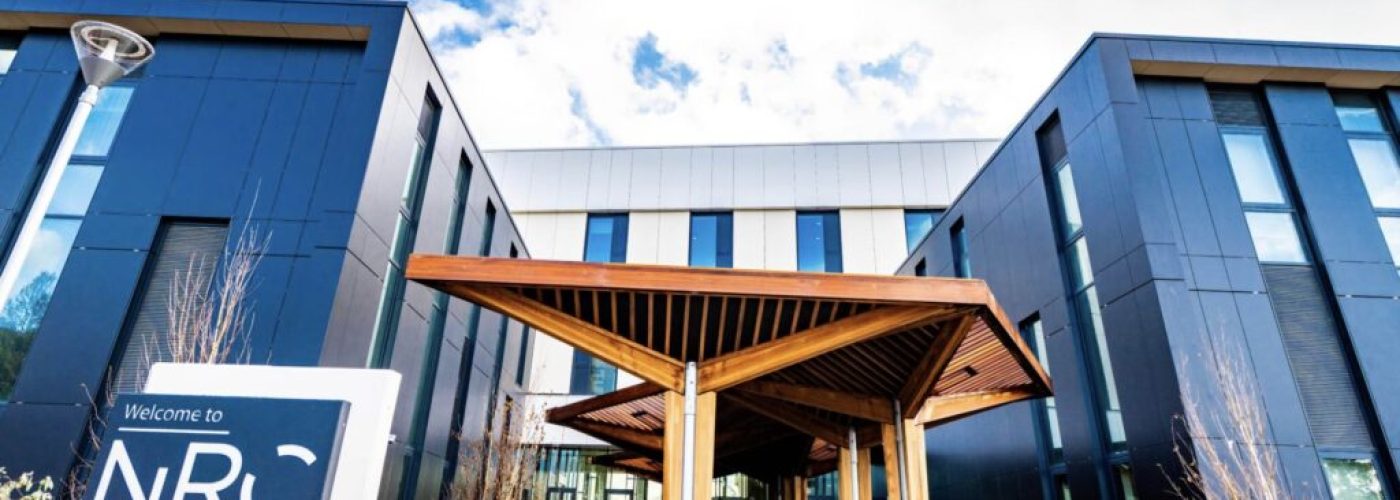- New £105 million NHS National Rehabilitation Centre will be run by Nottingham University Hospitals NHS Trust.
- Groundbreaking technology, earlier access and more intensive treatments will help more people to regain their ability following serious illness or injury.
- Home to the most comprehensive robotics suite in the NHS and first 360 hoist in Europe.
- Situated on 365-acre rural estate where it will share facilities with the Defence Medical Rehabilitation Centre (DMRC).
- Part of the government’s New Hospital Programme and the NHS’s first operationally carbon neutral building.
- Aims to transform rehabilitation provision on a national and international level.
The country’s first NHS National Rehabilitation Centre (NRC), based in Nottinghamshire, will soon open its doors to patients, heralding the beginning of a new era for rehabilitation.
The NRC is a 70-bed, state-of-the-art specialist rehabilitation centre for NHS patients who have experienced a life-changing illness or injury and is run and staffed by Nottingham University Hospitals NHS Trust (NUH).
NUH has developed the transformative clinical model to be able to deliver more intensive treatments and rehabilitation earlier in a patient’s journey, and has created a bespoke workforce and relevant training to support this.
The brand-new facility is co-located with the Defence Medical Rehabilitation Centre (DMRC) on the Stanford Hall Rehabilitation Estate (SHRE) near Loughborough. The concept of establishing Defence and National Rehabilitation centres on a single site was that of the late 6th Duke of Westminster back in 2009 and he purchased the SHRE for the purpose. At the same time the Black Stork Charity was specifically created to achieve the overall concept – not least by means of a successful funding campaign to raise the necessary £300m to create the Defence establishment and enable the National one.
Capital funding for the construction of the NRC was provided by the government’s New Hospitals Programme, and the building is the NHS’s first operationally carbon neutral building, featuring solar panels on the roof of the NRC and four air source heat pumps in the adjacent energy centre.
NHS patients at the NRC will benefit from:
- Earlier access to rehabilitation to enable better outcomes.
- Bespoke intensive rehabilitation programmes for each patient, supported by a dedicated and highly-skilled workforce, to enable them to reach their full potential during their recovery.
- Unlimited access to the 365-acre countryside Stanford Hall Estate including a 5km trim trail, a hand-cycle track, a fishing lake, and a pitch and put golf course. The Estate is, in itself, a rehabilitation asset and every bit as important as the buildings in the overall effort to return people to health and fitness. Plus, each patient bedroom has unobscured views across the estate.
- The most comprehensive robotics suite in the NHS, featuring cutting-edge technology from across Europe, including robots and devices which can be used when helping patients to walk again, relearn how to use their hands, and build function in specific parts of their body.
- The first 360 degrees hoist in Europe, located in the main NRC gym and enabling patients to learn to walk and move in a more realistic way.
- A digitally-advanced facility with real-time location technology to ensure patient and staff safety, a silent nurse call system and intelligent bedside screens to promote patient independence.
- Sharing of facilities at the DMRC, including a full hydrotherapy suite, an advanced gait lab, a Computer Assisted Rehabilitation Environment (CAREN) – a 360 degrees immersive virtual reality experience – and X-Ray and MRI machines. When built, the DMRC was deliberately designed to allow for future sharing with the NRC – all of these facilities are in the part of the DMRC nearest to the NRC (some 400m away) making it simple to get to them and to share them.
The NRC will primarily receive patients from across the East Midlands, many of them anticipated to come through the East Midland’s Major Trauma Centre – the busiest in the UK and based at NUH.
The national aspect to the NRC is that it will lead rehabilitation research and innovation, as well as providing training and education through an NRC Academy, all in collaboration with a consortium of 26 Universities throughout England. Patients at the NRC will have the opportunity to take part in research during their stay, with the aim of significantly reducing the time between identifying effective new treatments and them benefitting patients. Clinical staff will also all be encouraged to take part in research and educational activity.
What happens at the NRC is anticipated to be of international significance too – the research, innovation and evolution in rehabilitation technology and treatment is anticipated to be global in its impact and future potential.
The long-term ambition for the NRC is to be the national ‘hub’ in a future ‘hub and spoke’ model, or a single model multi-site service, with regional rehabilitation units (‘spokes’) established across the country to widen impact and benefit as many patients as possible.

Anthony May, Chief Executive of Nottingham University Hospitals NHS Trust, said:
“We are proud to be at the point of preparing to open the doors of this pioneering facility to our first patients. The difference the NRC will make to patients and families cannot be underestimated.”
“The NRC has been 15 years in the making. I should like to thank all those who have been involved for their perseverance, dedication and determination to make it a reality. I should like to pay a particular tribute to the Black Stork Charity for their considerable and unwavering support since the vision for the Centre was first conceived.”
“This is a significant moment for NUH, for rehabilitation medicine in this Country, and for the many NHS patients whose lives will be changed and restored in this groundbreaking facility, set in a unique location.
“Moreover, the innovation, research and knowledge generated from the NRC will help develop rehabilitation nationally and internationally.”
Miriam Duffy, NRC Director and physiotherapist, said:
“I am delighted that we are on the verge of opening the first NHS NRC and beginning the journey of transforming the way we provide rehabilitation in this country.
“The impact of timely and effective rehabilitation lasts a lifetime and can be the difference to enable someone returning to the home, work, family and hobbies that they love.
“By taking inspiration and learning from other rehabilitation centres across the globe, we are confident that we have delivered the very best rehabilitation facility where our dedicated and motivating staff will work with researchers and innovators to give our patients back their independence and the best quality of life possible.
“However, this is just the beginning, and the NRC is much more than just a building. Our aim is to revolutionise rehabilitation across the country so that every NHS patient who suffers a life-changing illness or injury receives the best rehabilitation possible and the best chance to return to living an independent and fulfilling life.”
Mark Preston, Chairman of The Black Stork Charity said:
“Fifteen years ago, the 6th Duke of Westminster decided to improve the rehabilitation facilities for members of the Armed Forces and, at the request of the Defence Secretary, to extend such provision to the nation as well. His action is why the new National Rehabilitation Centre (NRC) building is about to take patients – and that is a very good outcome and NUH has done well to get to this point.
“I think we can all be sure that the NRC will bring huge benefits – in this case for the East Midlands region. It promises to return many people to work and life in a way which is currently not the case, bringing in its wake improvements to the national workforce and the economy.
“This approach is novel and will need proving in the next couple of years and, if proven, Government should look to such provision across the country in the ‘hub and spoke’ way that is common in the NHS. The Charity and NUH will, together, do all in our power to ensure that this is the case.”
Minister of State for Health Karin Smyth said:
“This brand-new, state-of-the-art facility, backed by £105 million of government money, will transform care for patients who need specialist rehabilitation support.
“The National Rehabilitation Centre embodies the future of the NHS: community-based care, digital innovation, and a focus on prevention by reducing avoidable hospital readmissions.
“After years of decline, this project is a beacon of hope and shows the modern NHS we’re building – innovative, compassionate, and focused on giving every patient the best possible chance of recovery.
“I want to thank everyone involved from the trust, the construction workers, the defence community, and particularly the Black Stork charity, whose contribution has been huge.”
Sarah Collis, Chair of Healthwatch Nottingham and Nottinghamshire, said:
“The opening of the National Rehabilitation Centre marks a significant step forward in ensuring patients receive the highest standard of rehabilitation care. This centre has the potential to set a new benchmark for excellence in this vital area of medicine.
“Patients deserve nothing less than the very best – care that not only supports recovery but enhances quality of life. We look forward to seeing the positive impact this facility will have on individuals, families, and communities across our region.
“Healthwatch will continue to champion the voices of patients and the public, ensuring that services like the NRC deliver on their promise of outstanding care and support.”
The NRC was delivered by Integrated Health Projects (IHP), the joint venture between VINCI Building and Sir Robert McAlpine.
Mark Bessey, Director of Healthcare, IHP, said:
“The National Rehabilitation Centre marks a defining moment in healthcare infrastructure and promises to be a game changer for the quality of life of patients across the country dealing with serious injury or illness.
“This pioneering facility stands as a testament to exemplar collaboration, technical excellence, and a resolute commitment to sustainability coming together.
“From its smart hospital design and carbon-neutral credentials to the seamless integration of digital construction technologies, the NRC sets a new benchmark for patient-centred innovation and is set to become a global beacon for clinical rehabilitation, research, commercial innovation, as well as training and education.
“IHP are immensely proud to have worked alongside Nottingham University Hospitals NHS Trust, the New Hospital Programme, and our project partners to deliver a centre that not only transforms rehabilitation outcomes but also exemplifies the future of sustainable, data-driven healthcare.”
Building, Design & Construction Magazine | The Choice of Industry Professionals





